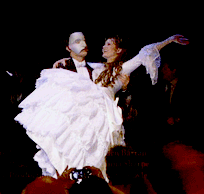Part 1. The Phantom Speaks for All of
Toward the end of The Phantom of the Opera, the Phantom finally captures his not-so-secret love Christine and takes her to his hiding place beneath the opera house. Here he lived for many years in darkness and loneliness away from the rest of the world because of his badly distorted face.

As he carries Christine to his shrine-like living quarters, they sing passionately to each other, wondering if they have “passed the point of no return.” It’s a moment of high drama as the Phantom sings to Christine, “Say you’ll share with me one love, one lifetime…Lead me, save me from my solitude.” As he sings, he places a ring in her hand and implores her, “Say you want me with you, here beside you. Anywhere you go let me go too. Christine, that’s all I ask of you.”
“Save me from my solitude.” It’s a song sung over and again by individuals who need meaningful personal relationships with other people just to survive. This universal human need drives both men and women to do strange things to attract and acquire the attention, companionship, and, ultimately, the love of another person. Most are not as melodramatic as the Phantom’s but are equally necessary. As the Bible says, “It is not good for man (or woman) to be alone.”
To save ourselves from our solitude, we court, we woo, we do what we must do to win the heart of that lovely “other.” The passion and delight of the courting experience are usually sublime as two lonely hearts discover things about each other that makes them so very attractive. It is as if every cell of their bodies, every event of their lives, every emotion of their hearts has been on hold until they found this, the ultimate compatible “other.” Together, they make promises to “never leave you nor forsake you,” or as the Phantom sings, “Anywhere you go, let me go too.”
Unfortunately, the passionate togetherness a couple feels early in their relationship can wear thin over time as their individualities demand acknowledgment and acceptance. The unity of their souls is challenged by the uniqueness of their separate egos. A couple that had “everything in common” on their wedding day can later look at each other across their king-sized bed and see a stranger. It’s no longer their friend and lover; it’s an unfamiliar someone, even an intruder for whom they feel little passion and sense no real pleasure in their company.
What happened to the togetherness? Why do two people who found great joy in each other’s presence suddenly look at each other as weird, unattractive, and even creepy?
There are five forces at work within relationships that cause a deterioration of togetherness: innate differences, lifetime experiences, relational IQ, cultural/social differences, and the secreting of the true self.
In future postings, I will examine these forces to discover how they affect relationships and what can be done to cause the forces to enrich rather than hinder togetherness.
If you are like the Phantom and you hide in the cellar of your own confinement, you will want to read each posting. At the conclusion of the series, it is my hope and prayer that you will be saved from your solitude and released to find real joy in your love relationship.
©2020 Dr. Ronald D. S. Ross





